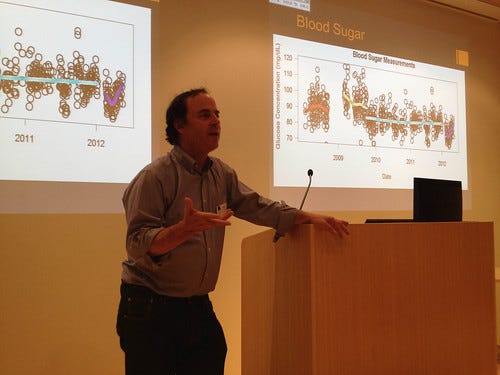Personal Science Week - 231130 Seth Roberts
Responding to recent news about a Personal Science pioneer
We first heard the term “Personal Science” via UC Berkeley Professor Seth Roberts, who was using the term since the early 2000s in his writing and on his popular blog https://sethroberts.net. Seth passed away in 2014, but many of us continue to find inspiration in his work.
This week we’ll review some of Seth’s ideas in response to some recent news about him. His long-running web site will be retired soon and, coincidentally, his long-time friend and Columbia University statistics professor wrote a lengthy critique of Seth’s techniques.
About Seth Roberts
After his death, I wrote this in a eulogy:
Like many people, I first heard about him back in 2006 through a chapter in the best-selling book Freakonomics. His strange habit of tracking various aspects of his life -- his sleep, his sense of balance – appealed to me in a geeky way. As a long-time self-quantifier myself, I found it reassuring to know that there were others out there, similarly interested in the practical day-to-day usefulness of science. Eventually I found his blog, and discovered that he was living near me in Beijing. A famous professor like him – a New York Times bestselling author and all that – might be hard to get ahold of, but one day out of the blue I sent Seth an email, wondering if he’d like to get together for lunch.
He replied in minutes and said sure, how about tomorrow? I was so excited (such a famous guy!), and I invited him to the cafeteria at my office (then at Microsoft in Beijing). We exchanged unconventional ideas, the kind I suspect are true but that I don’t necessarily want to say in public (but that he posts unashamedly to his blog): how radiation is actually good for you, how if you want to lose weight you should only drink real coke, not the diet kind, about the benefits of homemade yogurt. We talked about sleep measurement and microbes and personal experimentation to see what works and what doesn’t. It was a classic Seth Roberts conversation – challenging conventional wisdom, never taking anything for granted -- and I was hooked.
and
Although Seth was very sharp about most things, there was always one nagging area where I thought he was underprepared. I wanted him to pay more attention to the rise of sensors, mobile devices, and all the incredible new self-tracking and discovery they make possible. He dismissed them mostly as “lipstick on a pig” ideas. Scientists know practically nothing about the real causes of illness and wellness – what good can technology do if we don’t even have a framework for understanding the basics of health?
Seth is probably most famous for his “Shangri-La Diet”, which in the early 2000s was a best-seller, partly due to its unconventional and ridiculously simple advice: drink two tablespoons of olive oil sometime in the morning and otherwise whatever you want. Hundreds of thousands of people were inspired to try it, and there were many success stories.
Now one of the world’s best statisticians, Andrew Gelman, writes The rise and fall of Seth Roberts and the Shangri-La diet, in which he concludes:
If I could’ve done it all over again, I never would’ve promoted his diet, a promotion that led to all the rest.
Essentially, Gelman argues that internet fame went to Seth’s head and he “began to believe his own hype”. Soon he was running dozens of self-experiments with an incredible rate of success: he was curing his acne, his mood, his reaction time and more — all with simple, everyday techniques. Stand on one leg for n minutes per day. Take Vitamin D at sunrise, not other times of the day. Eat butter.
The point here is not that Seth believed things that turned out to be false—that happens to all of us—but rather that he had a soft spot for extreme claims that were wrapped in the language of science.
Gelman confesses that his new-found skepticism began after recent warnings from his doctor finally convinced him to take weight loss seriously. This was the first time that he actually tried Seth’s diet, but it soon occurred to him he could get the same effect by simply willing himself to eat less. He suggests that most diets work this way. We’ve previously noted this as well: you’ll lose weight no matter which aisle of the grocery store you give up.
Interestingly, Gelman doesn’t quantify his weight loss (100 pounds? 5 pounds? 0?) so it’s hard to tell how much his argument is based on personal experience. I don’t think that’s his point anyway. Instead, as he says “honesty and transparency are not enough”: no matter how carefully you treat your data, a poorly-designed study won’t tell you anything. Too many, perhaps most, studies are simply not big enough or carefully-constructed enough to give actionable results.
I don’t think Seth would have disagreed. Personal science, as practiced by Seth and the rest of us, isn’t trying to find Truth™ for everyone for all time. I just want to know what’s true for me, now. But I want my conclusions to be guided by more than amorphous “gut feelings”. That inspiration is the real legacy of Seth Roberts.
Seth Roberts Resources
If you’ve not encountered Seth Roberts’ voluminous writing about personal science, you’re in for a treat. He was an eloquent writer who tried hard to make his ideas accessible to normal people. Although the online version of his blog will be retired soon, you can download all 5000 pages as a 30 MB PDF file (Github, Facebook).
The best summary of his work is “The Growth of Personal Science: Implications for Statistics” in which he offers 14 specific examples of personal science involving health. The topics include blood sugar, sleep, mood, body weight, resistance to infection, and brain function.
The statistics magazine Chance published a dialog between Seth and Gelman that’s worth reading. Seth repeats his key advice: “If the effect is strong, you don’t need a big study”.
After his death, many of his fans gathered on the Seth Roberts Community Facebook group where we’ve continued to share the kinds of unconventional ideas that Seth appreciated.
About Personal Science
If you’re looking for productivity or health tips, there are better sites than this one. We are a short weekly summary for people who like to study the in-depth consequences of what it means to live a life oriented around science.
Personal Science Week, delivered each Thursday, is free. Paid subscribers can also read our series on “Unpopular science”, including our most recent post about Wikipedia. Please contact us if you have other topics of interest, ask informally in our chat, or leave a comment.





I think humans are essentially creatures of belief and can essentially rationalize anything. Science can be helpful in discovering actual truths, but there is also plenty of bad science out there to confuse things. Ancel Keys's work demonizing saturated fats has probably resulted in millions of premature deaths IMO, but most people aren't aware of how flawed his analysis is. To dig into it takes time and effort most simply aren't willing to devote.
Olive oil was a feature of Roberts's Shangri-La diet, but the commonly held belief today that olive oil is unusually good for you probably isn't accurate, either. I would argue that the chief virtue of olive oil is that it isn't soybean or corn oil, which have higher levels of omega-6 PUFAs (polyunsaturated fatty acids), which are known to be atherogenic when consumed in excess due to their pro-clotting properties when incorporated into the eicosanoids that manage the blood clotting process. According to the table in the Wikipedia article on vegetable oil, soybean oil is 51% linoleic acid (the major omega-6 PUFA found in food), and corn oil is 58% linoleic acid. Extra Virgin Olive oil, in contrast, shows as only 9.8% linoleic acid in the same table, a vast improvement.
While humans cannot manufacture either omega-6 PUFAs or the more beneficial omega-3's and require ingestion of both classes to be healthy, there is an enormous amount of evidence that the increasing consumption of omega-6's in the 20th century played a major role in the increase of heart disease in the same period. And at least some of that was due to Ancel Keys's work.
So yes, consume olive oil if you want to, and I think it is vastly more healthy than corn oil, in particular (corn oil has virtually no omega-3's, but soybean oil does have a slug, so its omega-6 to omega-3 ratio is not nearly as terrible as that of corn oil; although, it is still not great). Just don't buy into the idea that there is anything magical about olive oil. As basically creatures of belief, I think humans are prone to magical thinking, too.